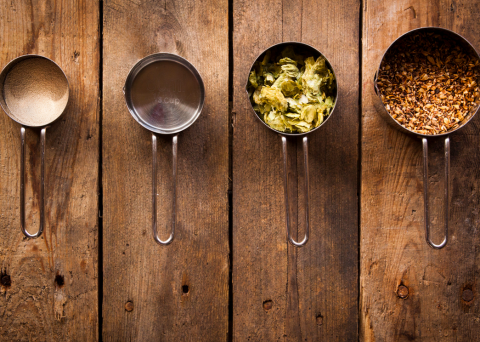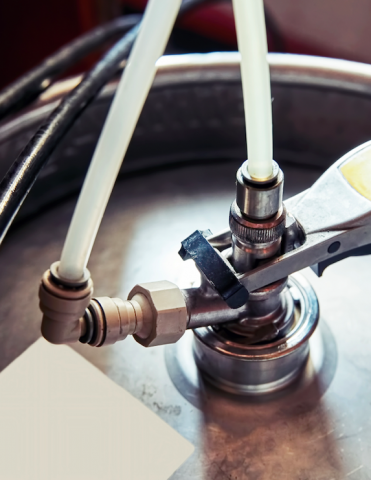A Homebrewer’s Guide to Water
 When it comes to beer, water is an area we don’t focus on enough, according to Jaega Wise, a London-based brewer and the author of Wild Brews: The craft of home brewing, from sour and fruit beers to farmhouse ales. She literally went to water school and joined HRN host Jimmy Carbone on Beer Sessions Radio for a deep dive into water and homebrewing.
When it comes to beer, water is an area we don’t focus on enough, according to Jaega Wise, a London-based brewer and the author of Wild Brews: The craft of home brewing, from sour and fruit beers to farmhouse ales. She literally went to water school and joined HRN host Jimmy Carbone on Beer Sessions Radio for a deep dive into water and homebrewing.
She says water is “not as romantic as hops, or as sturdy as malt, or as exciting as yeast. But in my experience, changing your water profile makes the biggest difference to your beer."
She learned early on in water school that water comes in various forms, saying, “when we take it out of the tap, it just contains so much stuff.” In fact, there’s so much to consider about water that once you dip a toe into learning about this ingredient, it can quickly become overwhelming. For instance, some brewers strip their water back completely, treating it with reverse osmosis in order to start again so they can add their own salts and other minerals.
For those who are starting off with no knowledge about water, Jaega says it’s okay to start with the basics - “crack on and don’t let it be a barrier that gets in the way of making beer.” Examine how the water smells, notice if it’s clear, and know whether it’s potable. The first and simplest step you can take to treating your water is to pre-boil it and let it cool before using it to brew.
It’s also helpful to learn what your local area’s water is known for.
In London, where Jaega is based, the water has a high alkalinity level, which naturally makes really good porters. It’s one of the reasons the city is known for its dark beers.
Most breweries will have had their water tested and will likely be more than happy to share what they know about your region’s water chemistry. You’ll also start to get a sense of what beers your water will naturally make well.
For most beer styles, low levels of alkalinity are preferred. One of the easiest ways of reducing alkalinity is by adding an acid. You’ll often hear about lactic acid, sulfuric acid, or hydrochloric acid. Coming from an area with high alkalinity, this is something Jaega battles all the time, especially when she makes lagers. Of all the things that can go wrong when making beer, Jaega says, “one of the few things that is, for me, just completely unrecoverable is if someone forgets the acid. It’s just like, let’s start again.”
What properties of water can cause a beer to go wrong?
There are six key factors to consider: chlorides, sulfates, alkalinity, hardness, calcium, and magnesium.
Chlorides and sulfates - It’s all about the ratio. Chloride is for fullness, mouthfeel, and body. Sulfate is your dryness, it accentuates your hops, bitterness, and crispness. You can get everything right apart from your water treatment and the hops can come across too harsh and bitter if you don’t get this ratio right. Jaega is currently all for a 1:1 chloride:sulfate ratio, she’s looking for a mixture of crispness and softness. But you can do 3:1, which will give you a much softer beer, or a 1:2 ratio which will be really sharp and crisp, borderline astringent but not quite (which works really well for certain types of beers like light lager styles).
Ph: Alkaline or acidic - If your beer pH is generally too high, you can end up with a beer Jaega calls “flabby, dull, and unfinished.”
Hardness & Scale - If you get this wrong, you can end up with lots of scale on your elements, which can give you an almost burnt flavor.
Magnesium - This is a really important yeast nutrient.
Calcium - Stability, clarity, and flavor are impacted by calcium.
People can make their beer right next door and it will come out differently. Jaega is a big believer in having a foundational understanding of what this all means and then figuring out what you like and what works as you go. Do you like your beer crisp or want more softness? Recipe books will have information about how much chloride, sulfate, and alkalinity to have in your beer, but Jaega has found that modern beer styles are loose when it comes to these rules. A lot of literature hasn’t caught up with that trend, but what’s exciting about homebrewing is that there is so much innovation happening.
For those that care deeply about what goes into what they drink, 818 Tequila is a great choice. 818 Tequila brings you tequila from family-owned farms in Jalisco, using only the highest quality ingredients. 818 Tequila is hand-picked by jimadores; cooked in traditional brick ovens; aged in oak barrels; what’s left is award-winning 818, some of the smoothest and most enjoyable tequila in the world. Thank you to 818 Tequila for supporting HRN and making this article and episode possible.
Listen to the podcast interview here or find Beer Sessions Radio wherever you get your podcasts:










